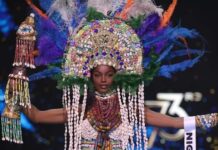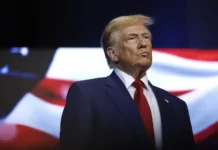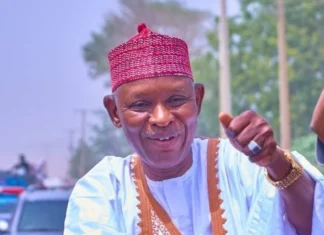Despite the malicious intent surrounding the amalgam that brought Nigeria together and the rivalry resulting from the montage of ethnicities, the country is a collection of attractive polyglots comprising prominent tribes like the Yoruba and Hausa-Fulani Igbo, Ijaw, Bini, Kanuri, Ibibio, Urhobo, Efik, etc.
This rich assemblage of over 370 tribes makes a melting pot of disparate cultures called Nigeria.
Because the indigenous people of these tribes are linked together by blood, culture, and dialect, they tend to identify with their tribe and are more loyal to the group than they are to the country, complicating any effort to unify the country along political, religious, or economic beliefs.
This divide had hounded the country since its formation one hundred years ago.
The complexity of Nigeria is not only because the tribes are at variance, which may or may not be an issue, but because they are competing for resources that have become scarce due to the abuse and bungling by the political class. And are often quarreling over the best way to share the crumbs left of the national cake after the gluttonous ruling elites have taken the lion’s share.
It is a commonplace to see the tribes justling to snatch the residue for themselves. All done to the detriment of the republic. This eccentric arrangement is reminiscent of a tribal system rather than a pluralistic or egalitarian one practiced in most industrialized nations. And a core tribal society is the obverse of a patriotic one that requires solid and unflinching support from the citizenry for the benefit of the whole extract rather than a segmented few.
The elements of patriotism, love, and dedication serving as an integral part of a nation’s growth are conspicuously missing in a tribal milieu. The desire to not only see one’s country thrive but actively work to ensure its development is the hallmark of an actual patriotic society or a nationalistic people. George Orwell describes this nationalism in one of his essays written at the end of the II World War, as “the habit of identifying oneself with a single nation or other unit, placing it beyond good and evil and recognizing no other duty than that of advancing its interests. . . . The abiding purpose of every nationalist is to secure more power and more prestige, not for himself but for the nation or other unit in which he has chosen to sink his own individuality.”
Thus, nationalism in the body polity of patriotism embodies sacrifice for the country, protect its honor and glory, and nursing her to burgeon into a prosperous one.
However, in Nigeria, patriotism is more of an ostentatious display than a desire to see the nation succeed. The feeling of patriotism is often discussed in feel-good speeches, conferences, debates, and sporting events, but it is copiously illusory in practice.
For instance, are the citizens not unpatriotic when they bribe private or government officials, disobey traffic rules, treat the law with disdain, and subvert the system to gain an advantage over others? Are the politicians or civil servants not traitorous when they empty the public till or divert resources earmarked for the public’s infrastructure to their private accounts?
Are the tribes not disloyal to the country? When they become insular, punitive, and operate on the ugliest notion of us-versus-them?
Consequently, such faithless tribal instinct is evident when an average Nigerian first identifies by his ethnic background before any sense of national belonging. This custom of knowing one’s origin in a conversation about National development was first fermented by the political class, which uses it to divide and stir suspicion and ethnic strife among the people for their selfish and short-term political gains. Now the citizens have bought into this divisive dogma hook line and sinker.
A cursory look at the Nigerian constitution shows a document riddled with tribalism.
This explains why a simple government form asks for an applicant’s state and local government origin rather than a plain address.
Tribalism in Nigeria is ubiquitous in all aspects of the country. From politics, economics, social justice, employment, healthcare, infrastructure to the distribution of resources. It controls what you think, say and who you support or oppose.
Tribe determines which tertiary institution one goes to, whether one gets a bargain at the market, whether a state receives a federal infrastructure project or that government largesse, who receives a government contract, all straight to the apex of the decision-making body deciding how resources are distributed.
To support this systemic pattern of tribal praxis, President Muhammadu Buhari, a northerner, recently came under fire along with his Chief of Naval Staff, Vice-Admiral Awwal Zubairu, also a northerner, for diverting government prestige project (naval base) to a landlock Kano where it least makes sense. Zubairu, a Kano state indigene, was appointed as the Navy Chief earlier this year. This is in addition to other military projects diverted to the northern region under Buhari’s term. Consider the implausible and illogical reasoning of locating a military arm whose specialty is operating in massive waters in a landlocked arid state. The idea could have been easily laughed off if it didn’t reinforce the tribal practice of a putrefy system because it explains an inclination to satisfy the morbid desire to bonanza one tribe or region over the others.
After all, a member of the tribe is the head of the government.
It is practices such as this that further divide the country along ethnic and language lines, brew distrust and hatred among a people who should have united under one common aspiration. Instead, the opposing units are invested in exercises that further impede the wheel of progress.
In order to forge a more perfect union, if it must, Nigeria should decide whether it wants to remain an ethnic nation or a body polity of people with national identity. Building on its diversity as the engine that will propel the development it desperately needs in a competing twenty-first-century economy.
As the country prepares to celebrate yet another year of independence, we expect it will be flush with fanfare and jubilant citizens in the homeland and the diaspora parading the green and white banner in a ritualistic ceremony symbolizing their love for the country.
All these will be profitless and futile if the country fails to confront its Achilles heel, tribalism.
If Nigeria will remain one entity and thrive as a component of great tribes and cultures, we must at foremost first be loyal and dutiful to the nation then to our tribe. And yes, we can do both. Embrace our multicultural identity whiles keeping faith with the country.
Email: Jlabode74@gmail.com
Twitter: @obanor












Hmmmmm, very interesting write up and well detailed.
I want to add that it is the elite politicians and the military cabals that divide us and plant the seed of hatred and ethnicity’s among us,it wasn’t like this in the beginning,as curruption is increasing for their selfish reasons their seeds where gaining ground on the citizens.
Until we go back to honesty and sincerely way of leaving we will deep further backward.America has his own tribal issues but the curruption on the elite politicians were minimal and hence you don’t notice the diversity of the country also the political elite ensure the system works and everyone benefits from the centre.
Thank you Lawrence for your comment. Our diversity shouldn’t have to divide us.